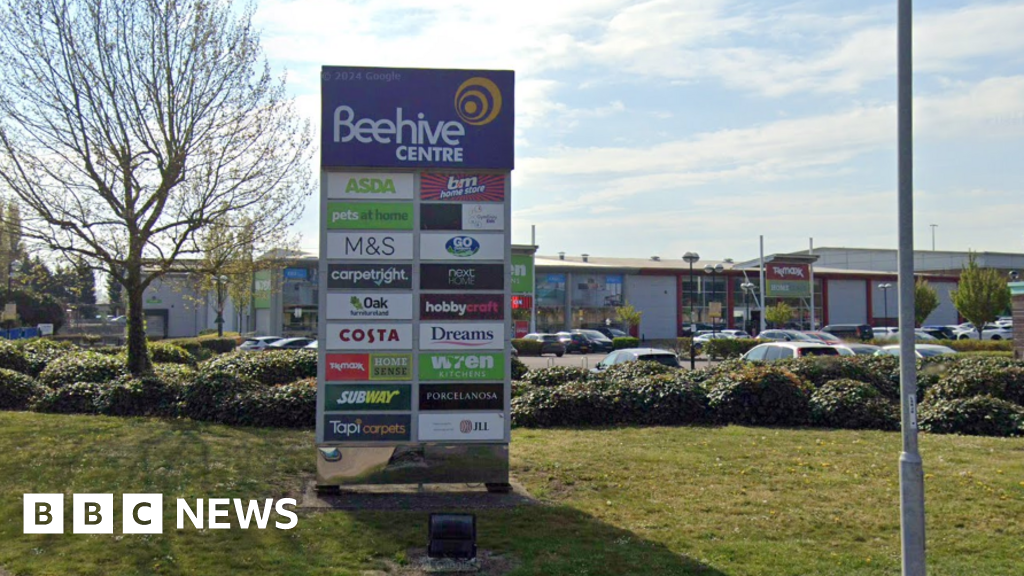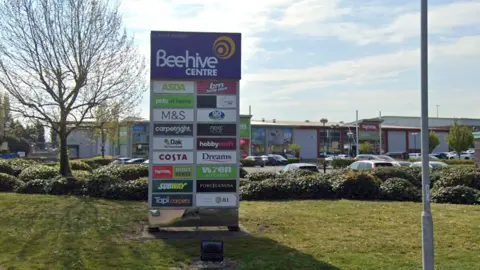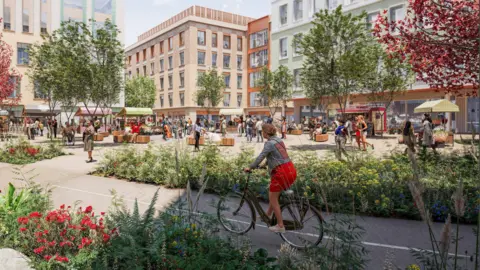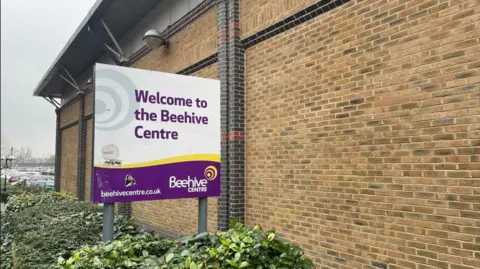What does ‘calling in’ a shopping centre development mean?

BBC political reporter, Cambridgeshire
 Google
GoogleWhere most planning developments are dealt with by local councils, who approve or reject them by committee, some require the government to take over the decision-making process.
This is known as “calling in”, and it is being used in the proposed redevelopment of a major retail park in Cambridge – the Beehive Centre.
But what does it actually mean?
Plans for the redevelopment of the Beehive Centre have been discussed for a number of years.
It is currently an almost fully occupied retail shopping park in the Abbey area of the city, and home to big high street names, like TK Maxx, Sports Direct and Boots – as well as Asda, Marks and Spencer and B&Q.
 Railpen
RailpenDecisions that are “called in” are common place for big transport projects, solar farms and large new towns, but rare in the redevelopment of retail space.
Developers, Railpen, said some retailers could be relocated to the neighbouring Cambridge Retail Park, which they also own.
‘Competitive economy’
Railpen wants to redevelop the Beehive Centre into laboratory space.
The city has been highlighted by the government as an area that can grow economically to rival Silicon Valley in California, with the region already dubbed “Silicon Fen”.
The government recently unveiled plans for a “growth corridor” between Cambridge and Oxford.
Its location could be the reason why the government has decided to “call the decision in”, meaning it will be considered at a higher level by the Planning Inspectorate, with an inspector appointed to carry out a public inquiry into the proposal.
A letter, sent minutes before the planning meeting started on Wednesday, said the secretary of state wanted to be “particularly informed” about several matters, including the development’s contribution to building a “strong, competitive economy” and achieving “well-designed places”.
It also requested the secretary of state be informed about “any other matters” considered relevant by the inspector.

Papers published before the meeting showed why the plans had been recommended for refusal.
There were concerns from locals that the new development would “significantly and adversely reduce daylight and sunlight” to many neighbouring residential properties.
Emma Smith, from a residents’ group called Better Beehive, said the group did not object to the redevelopment as a whole but had concerns about aspects of the plans.
About 150 houses would be affected by losing daylight “which affects wellbeing” she said, adding: “It can bring up all sorts of mental health problems.”
 Sunnica
SunnicaA number of other Cambridgeshire projects have been “called in” in recent years.
The Wisbech Incinerator plan was given the go-ahead, despite extensive local opposition, including from then Environment Secretary Steve Barclay, the area’s MP.
He had to recuse himself from the decision making process.
The new Labour government also gave permission for the Sunnica solar farm of the Cambridgeshire/Suffolk border.
A decision on moving the Cambridge Waste Water Treatment plan is currently being considered by DEFRA.
Related
Exclusive | Dave Portnoy is quietly shopping a book
Barstool Sports founder Dave Portnoy is shopping a book, Page Six has exclusively learned. Portnoy’s agency UTA is repping the tome, sources te
We Track Sales For A Living. Here Are The 30…
As shopping experts, we shop slowly and carefully to discern if a sale offers the most bang for our buck. From everyday essentials to larger splurges, knowing w
Can you afford to be patriotic when grocery shopping?
CBCPenguins bask on the shore of King George Island near Brazil's Comandante Ferraz research station in Antarctica.Antarctica is like no place on Earth. The "W
Our Readers Top Loved Products Last Month Were All Sleep…
1TOP-TESTED COTTON SHEETSCalifornia Design Den Cotton SheetsNow 23% OffCredit: California Design DenWhy we love it: If you have been reading our What's In My Ca












